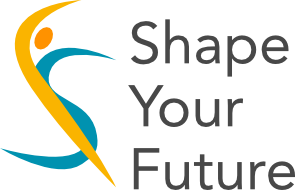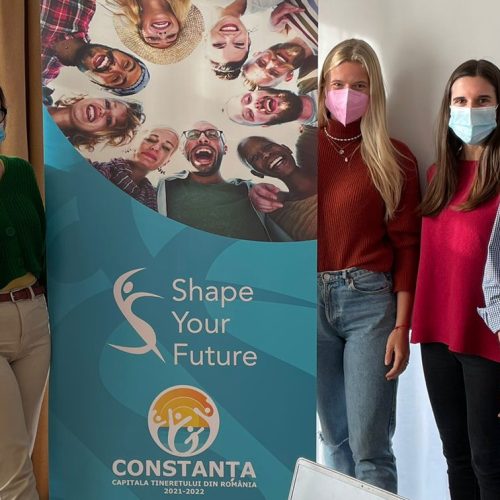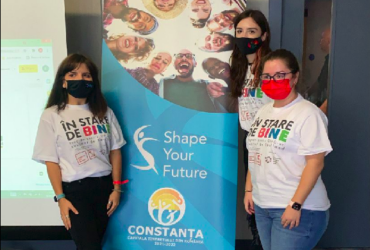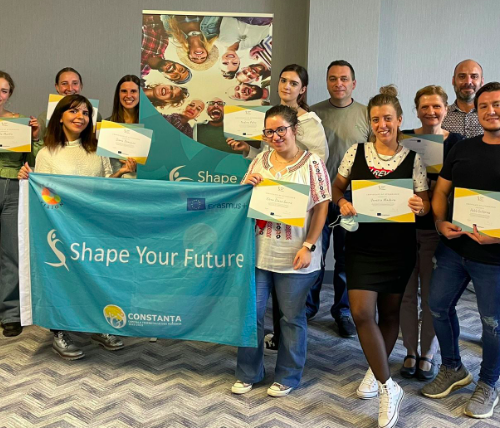In the midst of the pandemic, the “Shape Your Future” project, implemented by the Youth Vision Association, continued, and the activities carried out by each partner moved to the online environment. Thus, associations and youth organizations in Ireland conducted online activities such as round tables, consultations, focus groups in which young volunteers and representatives of youth associations and organizations had to answer questions about the pandemic activity, the problems encountered by NGOs during the pandemic, how the pandemic changed the activities of NGOs, what types of courses or materials those in NGOs would need to adapt their methods / activities to existing conditions, whether we are talking about the online or offline environment, possible obstacles in the use of digital tools in the NGO’s work, what are the main advantages and disadvantages of these online tools, what strategies do you use to motivate young people and how have they worked online with young people.
At the roundtable, NGOs in Ireland concluded that the pandemic has widened the digital inequality and digital divide gap as older people and digital illiterates are left behind again, allowing youth workers to discover new resources to promote the cause. At the same time, the pandemic was an opportunity for young people who have always wanted to be involved in online activities at this level and have never had the chance to do so before Covid-19. Organizations reported that the main obstacle to using digital tools for their work was the lack of sufficient media and digital skills. It wasn’t until the pandemic began that they realized they lacked digital skills and were reluctant to catch up. In carrying out their work, the organizations reported that they organized and joined group activities to solve social problems, such as those to prevent suicide. Moreover, they managed to prevent a fight organized on social networks by a group of gangs. They also cooperated with public institutions (such as their co-founders and government founders) to develop digital tools and platforms.
Non-governmental organizations have also established the advantages and disadvantages of online tools. One of the main advantages of online tools is the ability to interact with people in a remote setting, despite the restrictions. Another advantage is that after the pandemic, there will be a balance between digital and face-to-face interactions and it will facilitate meetings with partners. In terms of disadvantages, participants say that the digital divide is widening and vulnerable people are becoming increasingly disadvantaged if they do not receive enough support. Another downside has to do with the home environment: participating in zoom calls involves allowing people access to your home, where they can see your quality of life. This factor sometimes prevents young people from engaging in activities and keeping their cameras on.
Regarding the strategies used to motivate young people, respondents said that it is difficult for them to motivate young people because they are quite lethargic because of online schooling. They also use social networks to diversify their actions and try to organize football-related activities. Another strategy is to meet young people individually to engage with them and try to motivate them. When asked about the rating of online work with young people, participants agreed that working online with young people was extremely difficult because the dynamics of work teams and youth groups are distorted. They also report that working online has become frustrating for both young people and youth workers.
The Irish focus group was attended by young people from the NEETs group, aged between 10 and 24, and the session was divided into three parts – the first focused on the employment situation before Covid- 19. During the second, the current situation during the pandemic was discussed. In the third there were thoughts on the future prospects after the pandemic in terms of youth employment. Respondents agreed that finding a job was easier before the pandemic, as more jobs were open and young people had the opportunity to submit their CVs directly. Most participants reported that they prefer face-to-face activities, due to a better understanding of what the person is saying and it is more natural. They also claimed that they need normalcy, so this is another reason why they prefer personal activities. The young people reported that their isolation affected their biological clock: they had problems sleeping and waking up. Another problem – routine and lack of motivation, which increase the time spent playing video games. Moreover, the restrictions do not allow them to go anywhere and they feel that they have a lot of time to spend, but nothing is worth doing. Participants agreed that they wanted to improve their communication skills. In addition, they feel the need to expand their network and get to know someone in the business to find and keep a job.
At the same time, within the “Shape Your Future” project, which aims at the social inclusion of young people from disadvantaged backgrounds, integration into the labor market, facilitating access to educational and innovation programs and developing entrepreneurial skills, NGOs were forced to disseminate a questionnaire among young people, a questionnaire that included questions related to age, occupation, the need to improve or not some skills, pandemic training and education, support in identifying a job during the pandemic, we can conclude that the most many young respondents are between 18 and 26 years old (88%), over 87% are young, over 45% of them are unemployed, looking for a job. 50% of those interviewed expressed a desire to improve their technical, digital and communication skills and abilities. Over 70% of respondents said they did not receive any training to help them carry out their work or work during the pandemic, and the rest were trained in health, but would have liked to have been trained. receive training in the use of technology. Half of the respondents said that they did not receive any help to keep or find another job during the Covid-19 crisis, and most said that they did not need to improve their skills in order to keep or find a new job, and most would like to hone their speaking, technical and managerial skills.
Taking into account their answers and needs, the “Shape Your Future” project will create and make available to young people in the target group, from the five partner countries, the necessary tools to enable them to develop their social, entrepreneurial and professional skills in the market work.





